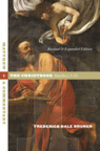
The Doctrine of our Total Undependability

All we like sheep have gone astray. Isaiah 53:6
In living color, almost everything between Jesus’ arrest and death presents the sinfulness of the human race. It seems to me that the Trial Stories are one long gallery illustrating Paul’s indictment: ‘All have sinned and fall short of the glory of God’ (Rom. 3:23). The Reformed churches, following Calvin, used to call this the doctrine of total depravity. I concur with the thesis of the doctrine, but its name is open to the misunderstanding that no created good remains in God’s rebellious creatures. Calvin’s exposition of the doctrine meant that every faculty, not every iota, of the human person was depraved (see the opening chapters of the second book of Calvin’s Institutes). Calvin had a high doctrine of creation (see the concluding chapters of the first book of the Institutes). Hence I will use the expression “total undependability” to describe the evangelical doctrine of human nature summarized in this long and important section (Matt.26:47-27:44).
In a way, this twenty-sixth-twenty-seventh chapter is the third,
summarizing exposition in the Gospel of what used to be called “The
Doctrine of Man”….What sets this chapter’s anthropology apart is the
evenhanded way it distributes guilt for Jesus’ death among all three
major social groups in the Gospel: Christians (Judas, Peter, and
finally all twelve), Jews (Sanhedrin, people), and Gentiles (Pilate,
soldiers). ‘All we…have gone astray.’
‘For the crucifixion to have taken place, the cooperation of three
simultaneous forces was needed…the treachery of Judas, who was a
Christian; the hatred of Annas, who was a Jew; and the indifference of
Pilate, who was a Gentile’ (Dominic M. Crossan…) ‘In light of a
theological reading of history, the trial of Jesus appears as a
universal conspiracy of God’s enemies against God and God’s anointed’
(R. Pesch…). We have seen the enemies, and they are – all of us.
Matthew, A Commentary, Volume 2: The Churchbook; Frederick Dale Bruner